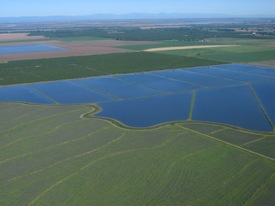If Dan Brekke isn’t editing newscasts at KQED Radio, chances are that he’s poring over charts full of arcane statistics from the state Department of Water Resources. Call it a hobby. Okay, call it an obsession. Either way, we frequently turn to Dan for his insights into California’s water conundrum.

Everything You Know is Wrong
By Dan Brekke
California is home to 37 million people—and to 37 million water experts. If no one’s ever said that, someone should have.
There’s nothing more central to life here and no subject that excites stronger opinions. Recent events have shown that those opinions can easily harden into certainty about what needs to be done to solve all of California’s water problems—the needs of those 37 million people, the needs of the state’s incomparably rich agricultural industry, the needs of native fish and ecosystems.
We’ve long since learned that one person’s “solution”—to build dams and divert water for farms and cities, say—can be another’s nightmare—for instance, the communities that depend on healthy fisheries for their well-being. The conflicts over water are so deep and longstanding that they can make rational discussion difficult or impossible.
This week, though, the Public Policy Institute of California published a report that aims to inject some understanding into the water debate by challenging opinions and misconceptions. The report tests eight widely-held beliefs about water against the complex realities that underlie them. The first myth is fundamental to how we see water issues: “California is running out of water.” The reality the PPIC and its all-star panel of water experts propose is a sobering one: “California has run out of abundant water (our italics) and will need to adapt to increasing water scarcity.”
There’s something in the list of myths to rankle just about everyone. One myth goes like this: “[Insert villain here] is responsible for California’s water problems.” The report goes on to assess several villain-candidates, including:
– Wasteful Southern California homeowners with their lush lawns and luxurious swimming pools,
– Farmers who get federally subsidized (read “cheap”) water, and
– Protections for endangered species (as in “Why are we giving water to that Delta smelt?”).
In reality, the report says, coastal Southern California does an excellent job of limiting residential water use; farmers getting cheap water are in fact paying a price for the subsidy and are becoming more efficient water users; and actions taken to protect the smelt has had a comparatively small impact on water shipments through the Delta.
The PPIC says in the introduction to “California Water Myths” that a “policy based on facts and science is essential if California is to meet the multiple, sometimes competing goals for sustainable management” of water for the rest of the century. No one can argue with that, though it’s certain that squabbles over water will persist. Maybe the best we as Californians can hope for is an honest effort to try to understand the needs of all other water users, and to give each of them the benefit of the doubt when considering solutions to our water problems.
The PPIC report: “California Water Myths,” is available on the institute website or in an excellent interactive version put together by the UC Davis Center for Watershed Sciences.
Meanwhile, how are we doing this winter? Not great. Below is an interactive map of California’s major reservoirs, comparing their current levels to average or “normal” levels for this time of year.
View KQED: California Reservoir Watch in a larger map
